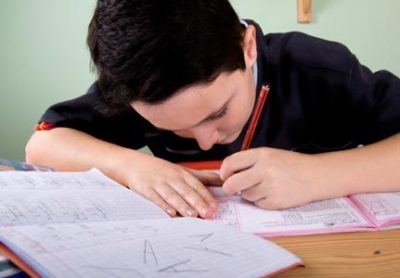Sitting in our office for the first time are a 12-year-old boy and his parents. “Bobby is not working up to his potential in school. Getting him to do homework is an argument every night!” his father says. As his parents express their worries about his academic future, Bobby stares out the office window and starts to yawn.
As we observe this family (a composite of several we have seen in our practices), it appears the parents are carrying the responsibility for their son’s academic future. We’ve determined Bobby doesn’t have any disabilities or other reasons for not working effectively. So our job is to help the parents give this responsibility back to their child.
This is a common scenario for middle school children and their parents. Middle school children enter a scene of more demanding academics and increased teacher expectation for student responsibility. These students have more homework than in elementary school, usually with less direct guidance from their teacher. Middle school students experience more freedom: changing classrooms for each subject, using lockers and taking advantage of study hall.
By the time a child reaches middle school, he or she should hold most of the responsibility for academic performance. While most parents understand this on an intellectual basis, putting it into practice can be difficult. When there is a situation where a parent is more concerned about the outcome than the child, it’s a recipe for trouble.
So, how do parents start shifting the concern about academics and homework to their child? A good place to start is for parents to examine their thinking about the parental role and their perceptions of what a responsible parent should do.
To use the example from above, as therapists, our task is to help Bobby’s parents develop a new way of perceiving the problem and their job:
Start to think of school as your child’s job and accept you cannot force him to learn. (Bobby already has this part figured out.)
Reasonable struggles are good for children. It develops their “emotional muscle” and builds self-confidence. It can be discouraging for a child confronting a struggle to have a solution handed to him.
Rather than focusing on solving a child’s problems, help the child find his own solutions. Challenge him to come up with a plan of action, with some parental guidance.
Develop faith that your child can learn to make good decisions. This entails allowing your child to make mistakes; view it as an opportunity for learning. Support your child’s efforts and don’t focus only on results.
The only way to teach responsibility is to give responsibility and the consequences that go with it.
So what does putting this into action look like? When it comes to nightly homework, a child’s role and parent’s role are different. It’s the parents’ job to structure the homework environment. It’s the child’s job to complete the homework.
Sit down with your child and come up with a homework plan. This is a negotiation process and compromise is key. As with any agreement, the devil is in the details, so be specific. For example, time and place as well as the environment while doing homework, meaning the TV is off and no phone calls. The agreement you come up with does not have to be forever. Set a time period, say five weeks, to see if the plan is working. As part of the negotiations, you need a way to evaluate if the plan is successful or not. If the plan is not working, sit down and come up with a new plan.
After instituting a homework plan, if you are running into a lot of resistance from your child, arrange a meeting for you, your child and his or her teacher. Your role is to help the teacher and your child come up with a homework plan that should be reviewed for success at a later date.
Don’t expect your child to quickly embrace this new responsibility. Most children eventually accept responsibility for their own academic performance once it is clear the parents will not. If your child turns in sloppy or incomplete homework, there will be a consequence with the teacher. He may have to do the worksheet again, or get a poor grade.
If your child’s grades start to slip, try not to panic. The shift of responsibility and worry over academic performance from parent to child may take a few months.
When Bobby returns to our office and is worried about what he needs to get done for school while his parents sit on the couch and listen, that’s a good sign!


